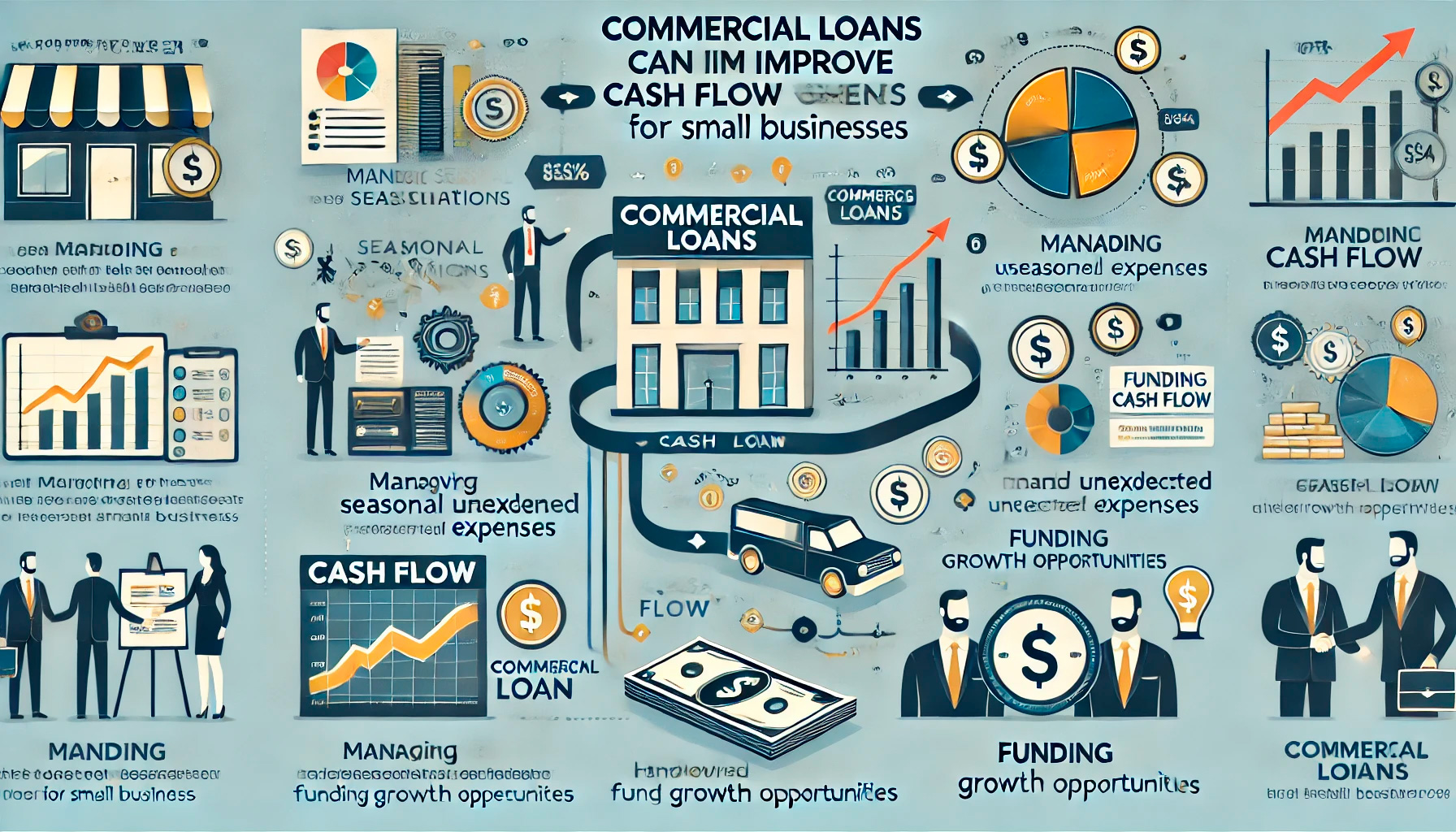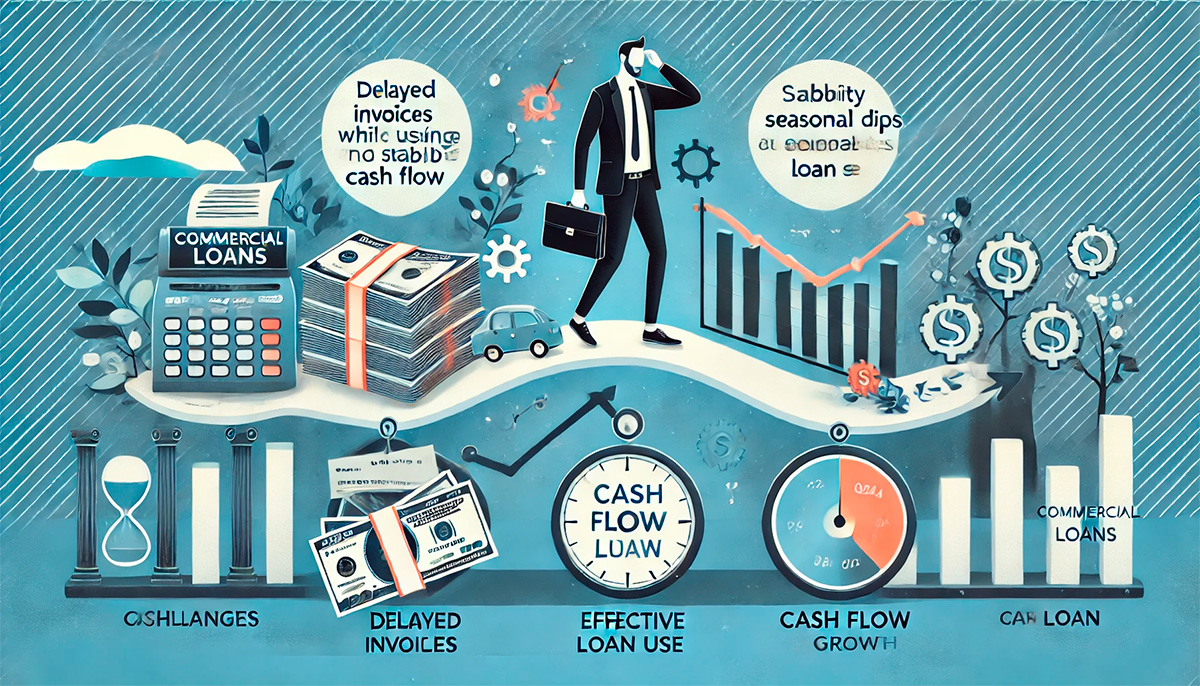
How Commercial Loans Can Help Improve Cash Flow for Small Businesses
Cash flow is the lifeblood of any business, but for small businesses, managing it effectively can be particularly challenging. Irregular revenue streams, seasonal fluctuations, and unexpected expenses can strain even the most carefully planned budgets. Commercial loans provide a practical solution to these challenges by offering access to the financial resources needed to stabilize cash flow and support growth.
This guide explores how commercial loans can improve cash flow for small businesses and ensure they remain resilient in dynamic markets.
Addressing Seasonal Fluctuations
Many small businesses experience seasonal revenue variations. For example, a retailer may see higher sales during the holiday season but struggle with lower demand during off-peak months. These fluctuations can create gaps in cash flow, making it difficult to cover operating expenses, payroll, or inventory purchases.
Commercial loans, such as lines of credit, provide the flexibility to address these seasonal cash flow gaps. Business owners can draw funds when needed and repay them as revenue increases during peak seasons. This ensures that the business can maintain smooth operations year-round without compromising financial stability. Additionally, leveraging a line of credit during slower months enables businesses to invest in marketing campaigns or product launches, driving sales even in traditionally quieter periods.
Managing Accounts Receivable Delays
Extended payment terms with customers can disrupt cash flow, especially for businesses that rely on timely receivables to fund daily operations. When invoices go unpaid for weeks or months, it becomes challenging to pay suppliers, employees, or other obligations.
Invoice financing, a type of commercial loan, allows businesses to borrow against their outstanding receivables. This provides immediate cash flow, enabling them to meet financial commitments while waiting for customers to pay. By leveraging unpaid invoices, small businesses can maintain liquidity and avoid the strain of delayed payments. This approach not only bridges the financial gap but also ensures that businesses can seize time-sensitive opportunities, such as bulk discounts on inventory.

Ensuring Timely Payroll
Meeting payroll obligations is a top priority for any business. However, cash flow constraints can make it difficult to ensure employees are paid on time, leading to dissatisfaction and potential turnover.
Short-term commercial loans or lines of credit offer a reliable solution to cover payroll during periods of tight cash flow. By securing these funds, businesses can ensure their teams are compensated without delay, fostering a positive work environment and maintaining employee morale. Consistent payroll funding also helps attract and retain top talent, strengthening the business’s competitive edge in the long run.
Supporting Inventory Management
Maintaining adequate inventory levels is crucial for small businesses, particularly those in retail or manufacturing. However, purchasing inventory in advance of peak demand can strain cash flow, especially when suppliers require upfront payments.
Commercial loans provide the capital needed to purchase inventory in bulk, often at discounted rates. This not only ensures that businesses can meet customer demand but also improves profit margins by taking advantage of supplier discounts. Additionally, having sufficient inventory prevents stockouts, which can lead to lost sales and dissatisfied customers. Proper inventory management through financing also positions businesses to respond quickly to market trends and shifting consumer preferences.
Handling Unexpected Expenses
Unforeseen expenses, such as equipment repairs, legal fees, or emergency purchases, can disrupt a small business’s financial plans. Without a financial safety net, these unexpected costs can deplete reserves and jeopardize operations.
A line of credit or a working capital loan can act as a financial cushion, providing the funds needed to address emergencies without draining cash reserves. This ensures that the business can continue operating smoothly while dealing with unexpected challenges. By preparing for contingencies through readily available funds, businesses can reduce downtime and maintain productivity even in the face of adversity.
Funding Growth Opportunities
Cash flow challenges often prevent small businesses from pursuing growth opportunities, such as expanding into new markets, launching new products, or investing in marketing campaigns. Commercial loans can provide the capital needed to seize these opportunities without disrupting day-to-day operations.
For example, a term loan can fund the purchase of new equipment, allowing the business to increase production capacity and meet growing demand. Similarly, a line of credit can support marketing initiatives that drive customer acquisition and revenue growth. By investing in these opportunities, businesses can enhance their competitive position and secure long-term success. Growth-focused financing also ensures that businesses can scale at the right time, maximizing profitability and market share.
Building Financial Resilience
Access to commercial loans enhances a small business’s financial resilience, enabling it to weather economic downturns or market changes. By having a reliable source of funding, businesses can adapt to challenges, such as declining sales or rising costs, without compromising their stability.
For instance, during an economic slowdown, a working capital loan can help cover essential expenses while revenue temporarily declines. This allows the business to maintain operations and prepare for recovery, ensuring it remains viable in the face of adversity. Building financial resilience through commercial loans also fosters confidence among stakeholders, including employees, suppliers, and investors.
Enhancing Cash Flow Predictability
Commercial loans can also improve cash flow predictability, particularly when used strategically. By aligning loan repayments with revenue cycles, businesses can ensure that cash flow remains stable and manageable.
For example, a business with seasonal revenue may structure its loan repayments to coincide with peak sales periods, reducing financial pressure during slower months. This tailored approach to financing ensures that the business can meet its obligations while maintaining financial flexibility. Predictable cash flow management helps businesses plan more effectively, paving the way for sustainable growth.

Improving Supplier Relationships
Timely payments to suppliers are essential for maintaining strong business relationships and securing favorable terms. Cash flow constraints, however, can lead to delayed payments and strained partnerships.
Commercial loans provide the capital needed to pay suppliers on time, fostering trust and goodwill. Strong supplier relationships often result in better pricing, priority access to inventory, and improved credit terms, all of which contribute to a healthier bottom line. Maintaining good supplier relationships also ensures operational consistency, reducing the risk of supply chain disruptions.
Conclusion: Empowering Small Businesses with Commercial Loans
Commercial loans are a powerful tool for small businesses seeking to improve cash flow and navigate financial challenges. By providing access to flexible and reliable funding, these loans enable businesses to address seasonal fluctuations, manage receivables, and seize growth opportunities without compromising operational stability.
With careful planning and responsible borrowing, small businesses can use commercial loans to build resilience, enhance profitability, and achieve their long-term goals. Whether addressing short-term needs or investing in future success, commercial loans empower small businesses to thrive in today’s competitive landscape.
By understanding the benefits and strategically leveraging commercial loans, small business owners can ensure their cash flow remains strong, their operations run smoothly, and their businesses are well-positioned for growth and success.
